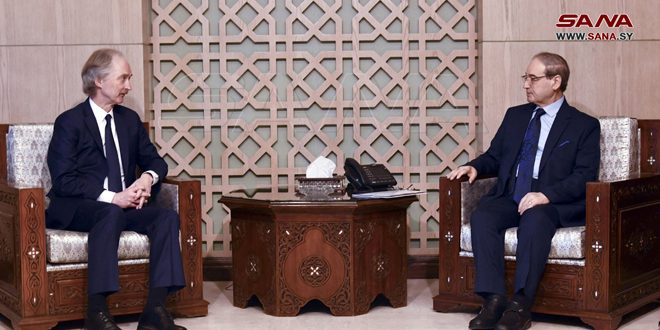In the complex landscape of Syrian diplomacy, contrasting narratives emerge from pro-government and opposition perspectives, particularly evident in the recent meeting between Syrian Foreign Minister Faisal al-Miqdad and United Nations Special Envoy Geir Pedersen in Damascus on March 17, 2024. These narratives offer a revealing study in the different tones and emphases placed on the discussions between Syria and the United Nations.
From a pro-government viewpoint, the meeting casts in light of cooperation and mutual effort toward addressing humanitarian issues and sovereignty concerns. The Syrian pro-government media portray the meeting as actively facilitating UN operations and striving to improve the humanitarian situation within the country, despite facing challenges from unilateral sanctions and foreign military presence deemed unauthorized. This narrative underscores Syria’s commitment to upholding national sovereignty and territorial integrity, as echoed in Minister Mikdad’s emphasis on the detrimental impact of sanctions and foreign aggression on the Syrian populace.
Pro-government Al-Watan reported that the core focus of their discussions was on the ongoing cooperation between Syria and the United Nations, specifically the support provided by the Syrian government to facilitate the operations of the UN offices within the country, including the Special Envoy’s Office.
Mikdad emphasized the imperative for the United Nations to uphold its responsibilities in halting violations of Syrian sovereignty. These violations include repeated Israeli aggressions on Syrian soil and the unauthorized presence of American and Turkish military forces within the country, all of which undermine Syria’s territorial integrity and sovereignty.
Opposition view
Conversely, the opposition-focused narrative, while acknowledging the same meeting, paints a more alarming picture of the situation in Syria, highlighting the stalled peace efforts and the worsening conditions on the ground. Special Envoy Pedersen’s concerns about the lack of progress in peace negotiations and the ongoing economic, security, and political challenges faced by Syria are brought to the forefront. The focus is on the urgent need for international support and a political solution to end the conflict, with a particular emphasis on the upcoming Constitutional Committee meeting in Geneva as a potential venue for breakthrough.
Opposition Website, Al-SouriaNet focused on Pedersen’s bleak views which he made after the meeting.
Addressing the media, Pedersen highlighted the severe security, economic, and political challenges facing Syria. He pointed out that without substantial progress on the political front, the situation is likely to deteriorate further, affecting both Syria’s stability and the well-being of its citizens.
“We should continue to meet in Geneva and develop the constitutional committee and the work of the committee in the manner that could give hope to the Syrian people,“ Pedersen said after meeting with Syrian Foreign Minister Faisal Mekdad.
The envoy’s comments reflect deep concerns over the lack of progress in resolving Syria’s conflict, despite the dire need for a political solution. With the Syrian situation seemingly headed in the wrong direction, according to Pedersen, the international community’s support for UN-led facilitation efforts remains critical. As the April meeting of the Constitutional Committee approaches, all eyes will be on Geneva, hoping for a breakthrough that can pave the way for lasting peace in
These diverging narratives illustrate the complex dynamics at play in the Syrian conflict and the international diplomatic efforts to resolve it. The pro-government story emphasizes sovereignty, cooperation, and the challenges imposed by external actors, portraying Syria as a victim of international politics and sanctions. In contrast, the opposition-aligned account stresses the urgency of addressing the humanitarian crisis and the critical role of international diplomacy in seeking a peaceful resolution, highlighting the UN’s efforts and the obstacles to peace.
Together, these perspectives reveal the multifaceted nature of the Syrian conflict and the challenges inherent in navigating the path towards peace and stability. They underscore the importance of understanding the different lenses through which the situation is viewed, reflecting the deep divisions and varying priorities that must be reconciled in the quest for a lasting solution to the conflict.
This article was translated and edited by The Syrian Observer. The Syrian Observer has not verified the content of this story. Responsibility for the information and views set out in this article lies entirely with the author.


